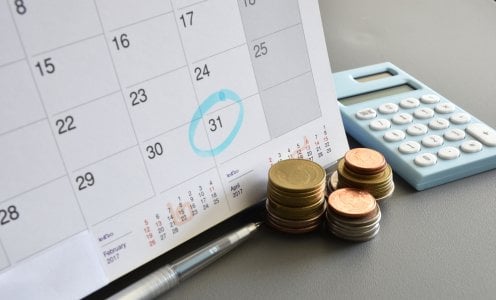Can you use calendars to track your finances? Expert says so!
By
Seia Ibanez
- Replies 8
Have you ever found yourself caught off-guard by an unexpected bill and thought, 'I wish there was a way to keep track of all this?'
Or maybe you've pondered how some people stay on top of their finances with effortless ease.
There is a secret to this, and it may be far simpler than you would suspect: the clue lies in your calendar!
Financial educator and author of Money School Lacey Filipich shared her ways of tracking her finances.
‘I've been using my calendar to plan and track major money events since my teens,’ she said.
‘Back then, it was an A5 diary. After having kids, the reminders moved to our family wall calendar alongside playgroup sessions and medical appointments.’
‘These days, it's an electronic calendar peppered with financial notes amid my meetings.’
Lacey’s calendar has served as a sentinel, ensuring she never slipped up on bills.
It has also nudged her to remember essential tasks in her ‘to-do’ list and has helped her manage her cash flow effectively.
Most importantly, calendars have saved Lacey from the shackles of 'free' trials that aren’t worth it.
Here are four transformative ways using a calendar can help you take charge and lift that financial mental load.
1. Plotting Major Bills
‘We've all been there: a forgotten big bill arrives. Your gut drops as you realise you haven't set aside enough cash for it,’ Lacey said.
‘Mapping out big bills on an annual calendar helps you plan ahead to set that money aside.’
Some of the common examples of bills include:
Also, automating your savings with scheduled transfers can save you time and effort.
2. Distributing Financial Load
Once you have recorded everything on your calendar, you might see periods that are overloaded with bills.
‘In my case, it was July and August. I used to have $12,000 of insurance and housing costs hitting all at once,’ Lacey said.
‘Even with a buffer fund and diligent saving, it still came as a slug, especially in my 20s.’
Lacey opted for monthly health insurance payments rather than the lump sum, rescheduled her contents insurance while switching providers, and paid three months of registration rather than her usual 12 months to ‘reset the clock there’.
‘The effect was spreading the $12,000 across several months instead of just two, and a much happier financial experience,’ she said.
3. Set Reminders for Key Activities
Adopting an approach to reviewing financial elements regularly is crucial.
According to Lacey, an annual reminder can prompt you to evaluate your superannuation via the YourSuper comparison tool, ensure your binding death benefit nomination (BDBN) is up-to-date, and visit the attorney to verify the validity of your will.
‘You might also add checking for better deals on your insurances here so you don't end up paying a loyalty tax,’ she suggested.
‘Or, you could add that to the individual insurance bill notes, with a reminder a month prior to shop around for better deals.’
Lacey’s calendar includes recurring reminders about her income tax reporting and mortgage rates.
‘My reminder is in late September, as most of the [income tax] reporting data has flowed through by then. I pair this with the superannuation and will check above, treating it like a mini financial planning session,’ she said.
She would also call her bank once a year to ask for a discount on her mortgage interest rate.
‘I still reckon it's the quickest way to save yourself $20,000 with your clothes on.’
You could have cultural duties to fulfil.
For instance, during the Lunar New Year, there's an anticipation of giving money as a gift.
Setting up reminders to organise the red envelopes and their contents each year could prove helpful.
4. Dynamic Adjustments
For those with a variable income stream, Lacey suggested using a calendar to plan for when hefty payments are due.
‘For example, if you know a contract payment is due on a specific date, pop a note on that date to send some money to savings when it arrives,’ she said.
‘I also put reminders in my calendar for the end of free trials, so I can cancel them if I don't want to continue. Including the cancellation link means I don't have to hunt for it on the day.’
‘I set these for two days prior to the end date so I don't get caught out by a technical glitch or miss a reminder.’
You may be trying to find a solid savings strategy, but where do you start?
In a previous story, a licensed professional financial educator shared her top money-saving tips for this year.
Her money habits are designed to help you navigate the financial challenges everyone is facing. You can read more about it here.
Members, please remember each one's financial circumstances are different, and while the calendar method can be a helpful tool, you should also seek independent professional advice for personalised financial guidance.

Would you use a calendar system for your finances? Can you think of more ways this system could be utilised? Share your experiences and thoughts below.
Or maybe you've pondered how some people stay on top of their finances with effortless ease.
There is a secret to this, and it may be far simpler than you would suspect: the clue lies in your calendar!
Financial educator and author of Money School Lacey Filipich shared her ways of tracking her finances.
‘I've been using my calendar to plan and track major money events since my teens,’ she said.
‘Back then, it was an A5 diary. After having kids, the reminders moved to our family wall calendar alongside playgroup sessions and medical appointments.’
‘These days, it's an electronic calendar peppered with financial notes amid my meetings.’
Lacey’s calendar has served as a sentinel, ensuring she never slipped up on bills.
It has also nudged her to remember essential tasks in her ‘to-do’ list and has helped her manage her cash flow effectively.
Most importantly, calendars have saved Lacey from the shackles of 'free' trials that aren’t worth it.
Here are four transformative ways using a calendar can help you take charge and lift that financial mental load.
1. Plotting Major Bills
‘We've all been there: a forgotten big bill arrives. Your gut drops as you realise you haven't set aside enough cash for it,’ Lacey said.
‘Mapping out big bills on an annual calendar helps you plan ahead to set that money aside.’
Some of the common examples of bills include:
- Insurance
- Car registration
- Council rates and strata fees, if you own a home
- Up-front rent and bond, if you need a new lease
Also, automating your savings with scheduled transfers can save you time and effort.
2. Distributing Financial Load
Once you have recorded everything on your calendar, you might see periods that are overloaded with bills.
‘In my case, it was July and August. I used to have $12,000 of insurance and housing costs hitting all at once,’ Lacey said.
‘Even with a buffer fund and diligent saving, it still came as a slug, especially in my 20s.’
Lacey opted for monthly health insurance payments rather than the lump sum, rescheduled her contents insurance while switching providers, and paid three months of registration rather than her usual 12 months to ‘reset the clock there’.
‘The effect was spreading the $12,000 across several months instead of just two, and a much happier financial experience,’ she said.
3. Set Reminders for Key Activities
Adopting an approach to reviewing financial elements regularly is crucial.
According to Lacey, an annual reminder can prompt you to evaluate your superannuation via the YourSuper comparison tool, ensure your binding death benefit nomination (BDBN) is up-to-date, and visit the attorney to verify the validity of your will.
‘You might also add checking for better deals on your insurances here so you don't end up paying a loyalty tax,’ she suggested.
‘Or, you could add that to the individual insurance bill notes, with a reminder a month prior to shop around for better deals.’
Lacey’s calendar includes recurring reminders about her income tax reporting and mortgage rates.
‘My reminder is in late September, as most of the [income tax] reporting data has flowed through by then. I pair this with the superannuation and will check above, treating it like a mini financial planning session,’ she said.
She would also call her bank once a year to ask for a discount on her mortgage interest rate.
‘I still reckon it's the quickest way to save yourself $20,000 with your clothes on.’
You could have cultural duties to fulfil.
For instance, during the Lunar New Year, there's an anticipation of giving money as a gift.
Setting up reminders to organise the red envelopes and their contents each year could prove helpful.
4. Dynamic Adjustments
For those with a variable income stream, Lacey suggested using a calendar to plan for when hefty payments are due.
‘For example, if you know a contract payment is due on a specific date, pop a note on that date to send some money to savings when it arrives,’ she said.
‘I also put reminders in my calendar for the end of free trials, so I can cancel them if I don't want to continue. Including the cancellation link means I don't have to hunt for it on the day.’
‘I set these for two days prior to the end date so I don't get caught out by a technical glitch or miss a reminder.’
You may be trying to find a solid savings strategy, but where do you start?
In a previous story, a licensed professional financial educator shared her top money-saving tips for this year.
Her money habits are designed to help you navigate the financial challenges everyone is facing. You can read more about it here.
Members, please remember each one's financial circumstances are different, and while the calendar method can be a helpful tool, you should also seek independent professional advice for personalised financial guidance.
Key Takeaways
- Lacey Filipich said that using a calendar system can significantly assist in managing personal finance tasks and planning for big bills.
- Mapping out big bills annually helps prepare for savings and prevents the stress of being caught short when they're due.
- Setting calendar reminders for important financial activities, such as checking superannuation deals, keeping insurance up to date, and reviewing mortgage rates, is beneficial.
- For those with an irregular income, reminders for financial actions post-payment dates can help manage savings and expenditures effectively.









